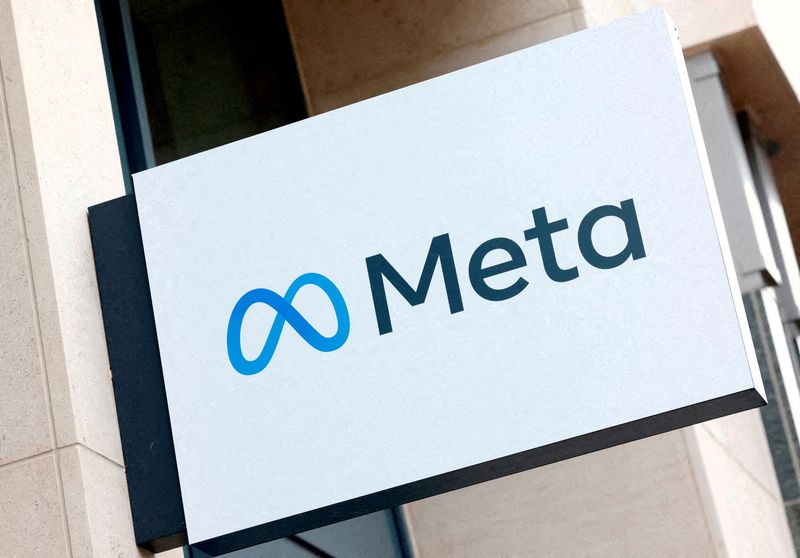By Katie Paul
NEW YORK (Reuters) -Meta is releasing a commercial version of its open-source artificial intelligence model Llama, the company said on Tuesday, giving start-ups and other businesses a powerful free-of-charge alternative to pricey proprietary models sold by OpenAI and Google.
The new version of the model, called Llama 2, will be distributed by Microsoft (NASDAQ:MSFT) through its Azure cloud service and will run on the Windows operating system, Meta said in a blog post, referring to Microsoft as "our preferred partner" for the release.
The model, which Meta previously provided only to select academics for research purposes, also will be made available via direct download and through Amazon (NASDAQ:AMZN) Web Services, Hugging Face and other providers, according to the blog post and a separate Facebook (NASDAQ:META) post by Meta CEO Mark Zuckerberg.
"Open source drives innovation because it enables many more developers to build with new technology," Zuckerberg wrote. "I believe it would unlock more progress if the ecosystem were more open."
Making a model as sophisticated as Llama widely available and free for businesses to build atop threatens to upend the early dominance established in the nascent market for generative AI software by players like OpenAI, which Microsoft backs and whose models it already offers to business customers via Azure.
The first Llama was already competitive with models that power OpenAI's ChatGPT and Google's Bard chatbot, while the new Llama has been trained on 40% more data than its predecessor, with more than 1 million annotations by humans to fine-tune the quality of its outputs, Zuckerberg said.
"Commercial Llama could change the picture," said Amjad Masad, chief executive at software developer platform Replit, who said more than 80% of projects there use OpenAI's models.
"Any incremental improvement in open-source models is eating into the market share of closed-source models because you can run them cheaply and have less dependency," said Masad.
The announcement follows plans by Microsoft's largest cloud rivals, Alphabet (NASDAQ:GOOGL)'s Google and Amazon, to give business customers a range of AI models from which to choose.
Amazon, for instance, is marketing access to Claude - AI from the high-profile startup Anthropic - in addition to its own family of Titan models. Google, likewise, has said it plans to make Claude and other models available to its cloud customers.
Until now, Microsoft has focused on making technology available from OpenAI in Azure.
Asked why Microsoft would support an offering that might degrade OpenAI's value, a Microsoft spokesperson said giving developers choice in the types of models they use would help extend its position as the go-to cloud platform for AI work.
INTERNAL MEMO
For Meta, a flourishing open-source ecosystem of AI tech built using its models could stymie rivals' plans to earn revenue off their proprietary technology, the value of which would evaporate if developers could use equally powerful open-source systems for free.
A leaked internal Google memo titled "We have no moat, and neither does OpenAI" lit up the tech world in May after it forecast just such a scenario.
Meta is also betting that it will benefit from the advancements, bug fixes and products that may grow out of its model becoming the go-to default for AI innovation, as it has over the past several years with its widely-adopted open source AI framework PyTorch.
As a social media company, Zuckerberg told investors in April, Meta has more to gain by effectively crowd-sourcing ways to reduce infrastructure costs and maximize creation of new consumer-facing tools that might draw people to its ad-supported services than it does by charging for access to its models.
"Unlike some of the other companies in the space, we're not selling a cloud computing service where we try to keep the different software infrastructure that we're building proprietary," Zuckerberg said.
"For us, it's way better if the industry standardizes on the basic tools that we're using and therefore we can benefit from the improvements that others make."
Releasing Llama into the wild also comes with risks, however, as it supercharges the ease with which unscrupulous actors may build products with little regard for safety controls.
In April, Stanford researchers took down a chatbot they had built for $600 using a version of the first Llama model after it generated unsavory text.

Meta executives say they believe public releases of technologies actually reduce safety risks by harnessing the wisdom of the crowd to identify problems and build resilience into the systems.
The company also says it has put in place an "acceptable use" policy for commercial Llama that prohibits "certain use cases," including violence, terrorism, child exploitation and other criminal activities.